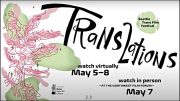Coinciding with the International Transgender Day of Remembrance, an event held every November 20 to recognizes individuals who have been murdered in the previous year because of their gender identity or expression, a new book details the experiences of transgender people today. Genny Beemyn and Sue Rankin’s The Lives of Transgender People (Columbia University Press, 2011) is based on a survey of nearly 3,500 self-identified transgender individuals and follow-up interviews with more than 400 of the participants, making it one of the largest studies involving transgender people in the United States.
Beemyn and Rankin consider how people who identify somewhere on the transgender spectrum (androgynous, gender nonconforming, genderqueer, transfeminine, transmaculine, transgender, etc.) experienced their gender identities growing up and how they came to see themselves as transgender. “One of the finding that surprised us was the wide variety of ways that people identified,” states Beemyn, the director of Stonewall Center at the University of Massachusetts, Amherst, and a transgender person hirself. “When asked to describe their gender identities, the participants provided more than a hundred different responses.”
Given the lack of research on the climate for transgender people in the United States today, the book breaks new ground by examining the participants’ concerns for their physical safety, their fear of being outed as transgender people, and their experiences with employment discrimination and harassment. Beemyn and Rankin find that despite greater societal recognition of transgender people and a growing transgender rights movement, individuals who are or who are perceived as transgender commonly continue to face discrimination, harassment, and bias-motivated violence.
“The climate for transgender people is less than welcoming”, says Rankin. “Our results parallel the findings of other recent studies indicating that transgender youth in particular at risk for gender bias.”






